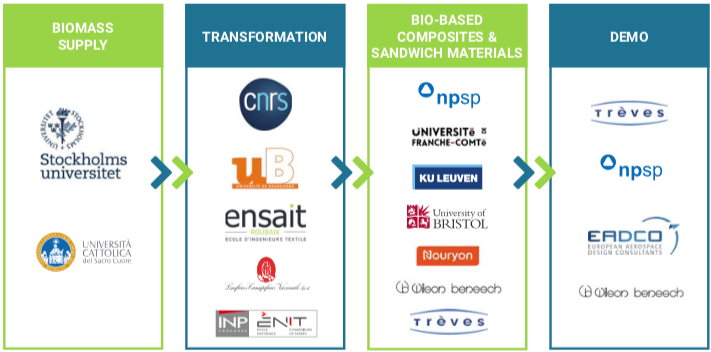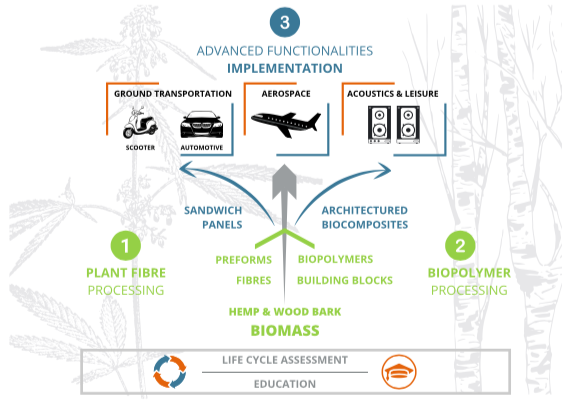Vincent Placet, Research Engineer at the UFC/FEMTO Institute of Besançon, (France) and Coordinator of the EU project SSUCHY, highlights achievements in sustainable & advanced bio-based composites
SSUCHY is an EU-funded project aiming to develop fully bio-based composites with improved functionalities for several sectors: automotive, aeronautics, audio or electronics. The Consortium counts 17 partners from 7 European Countries, including academia, SMEs and industries, under the coordination of UFC/FEMTO Institute (France).
What is the SSUCHY Project?
Recently, the composites sector renewed its interest in plant fibres of various origin alongside polymer building blocks derived from lignocellulosic feedstock. Plant fibres are interesting from both technical (e.g. specific mechanical & damping properties) and sustainable aspects (e.g. renewable resource, low production cost, creation & preservation of agricultural employments). The other face of the biobased composite lies in the bio-based polymers, which can be a good opportunity to further use under-exploited wood fractions instead of burning them.
In that context, SSUCHY is a research & innovation project, aiming to build a bio-based composites value chain from hemp and wood feedstock with initial technologies ranging from Technology Readiness Level (TRL) 2 to TRL5 with the ambition to develop some of its solutions up to TRL7.
To achieve that ambition, the project is using technologies and materials developed within its frame, alongside a market available solution when the materials developed in the project do not meet the basic quantity or quality requirements for prototyping a product. SSUCHY is impacting the composite sector by improving functionalities such as loadbearing resistance, weight reduction, enhanced durability, vibration damping, vibro-acoustic control and fire retardancy.
SSUCHY’s approach is implemented within the framework of a multi-level eco-efficiency approach covering experimental aspects, modelling, design, process optimisation and complete Life Cycle Analysis of the developed products.
SSUCHY’s partners
SSUCHY’s consortium covers the overall value chain: it starts from the biomass supply, followed by the transformation processes step related to plant fibre reinforcement on one hand, and biobased polymers on the other hand, up to the design and manufacturing of actual composites & sandwich materials and finally, the prototyping of products.
SSUCHY’s achievements on bio-based polymers & hemp fibre reinforcements
Applied research on bio-based polymers consists of transforming under-exploited wood fractions (such as bark) into building blocks for thermoset & thermoplastic polymers. So far, the thermoset track is the most advanced and the project is currently working to find a solution to scale-up the production of some candidate monomers. Great advancements were also made in the development and use of novel curing systems making the thermoset system water-insensitive and thus allowing the use of non-dry plant fibres.

Regarding the woven hemp fibre reinforcement, huge progress was made on cultivation and primary and secondary processing steps to obtain high-quality fabrics compatible with structural applications.
Finally, the work carried out on the design and characterisation of biobased composites and sandwich panels resulted in the integration of part of SSUCHY’s developed materials in final industrial demonstrators. Indeed, by mid-2021, all the demonstration prototypes will embark 100% SSUCHY-made hemp woven reinforcements.
SSUCHY’s prototypes for industrial demonstration
SSUCHY’s approach for demonstration is to transform existing products and by substituting, as largely as possible, current fossil-based structural components by bio-based components. It started with 3D-modelling the mechanical behaviour of each structural product in its regular functioning mode, then used computer-aided design (CAD) to redesign/reinforce the biobased prototype versions of the products. After three years, the project managed to work on four final demonstrators in transportation and leisure sector. More specifically, “Green Loudspeaker” and a “bio-based cockpit panel for electrical aircraft were produced in a final form and started testing for various vibro-acoustic and specific properties. A bio-based monocoque electrical scooter and hemp-based trunk loadfloor are expected to be finished before mid-2021.
What is expected for the last period?
Within the last year of the project, SSUCHY will complete the production and testing of its products demonstrators, alongside accelerating the dissemination and exploitation of its results. Notably, the project will organise, jointly with other EU projects, a Summer School to train Master and PhD students based on recent natural fibres findings. The project will also connect with external initiatives regarding the end-of-life of biobased composites.
Finally, the recent COVID-19 pandemic seems to have given the bio-based sector an important role in the European recovery to come. An increasing trend towards regionalisation is expected, with ongoing efforts to establish a web of interconnected EU regional economies, helping offset many of the issues heightened by the pandemic – short supply chains, local feedstocks and increased demand for locally produced goods. Hemp fibre cultivation and lignocellulosic derivatives smart exploitation may be part of the solution.
You can follow SSUCHY’s Updates on:
- Twitter: https://twitter.com/ssuchy_eu
- LinkedIn: www.linkedin.com/company/ssuchy
- Website: www.ssuchy.eu
This project has received funding from the Bio-Based Industries Joint Undertaking under the European Union’s Horizon 2020 research and innovation program under grant agreement No 744349.
Please note: This is a commercial profile











